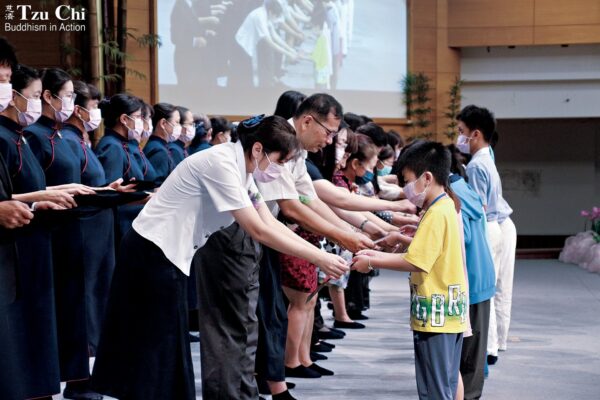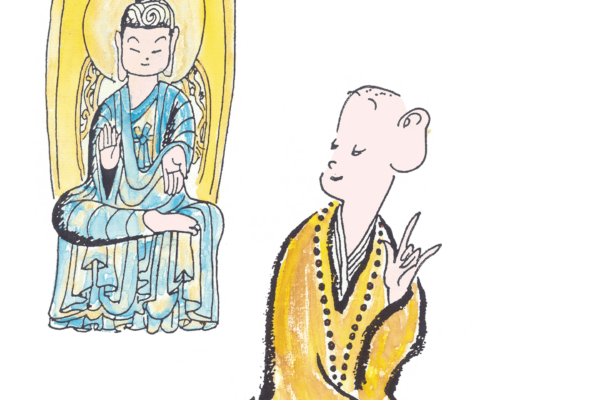By Cheah Lee Hwa
Translated by Wu Hsiao-ting
Photo by Hsiao Yiu-hwa
There is more to listening than simply hearing another person. Listening involves compassion, empathy, and the willingness to extend understanding to another.

Many years ago, a student of mine told me he heard a goose laughing. I teased him for being inattentive, telling him that geese don’t laugh—they honk. And just recently, a friend of mine began losing his temper frequently, snapping at others. I figured something was wrong with him and tried to ignore him. He complained a lot too, which drove me further away from him.
What is the thread connecting these two stories? It’s that they show I lacked the ability to really listen, something that my student who could hear the goose laughing probably possessed.
What is the ability to listen? A person who can listen patiently and compassionately never derides others for what they say. A person who can listen attentively and sincerely never turns a deaf ear to others; they hear what is really troubling the speaker and can detect their fear and anxiety. They can even hear cries for help from people whose temper has gotten the better of them.
In fact, most people who have a bad temper or who like to complain are that way because they have not received enough love in their lives. When you listen with sincerity, attention, and compassion, you encourage them to give voice to their problems. Even if what they say is full of misguided views and prejudices, they very likely will become more peaceful because of your patient listening ear.
Many people take their problems to Dharma Master Cheng Yen and ask for her advice and guidance. You can sometimes even see them, deeply troubled by their problems, crying in front of the Master. But it often happens that just a couple of words from the Master can soothe their pain, perhaps even make them laugh through their tears. How does the Master do it? She stresses the importance of observing and listening with compassion and wisdom.
The Master once explained the importance of listening with care by telling a story about an impoverished woman and Ananda, one of the Buddha’s disciples.
In the story, the impoverished woman took a detour whenever she saw the Enlightened One coming her way; she did her best to always avoid him. Everyone was perplexed by her behavior and thought it very strange. After all, the Buddha was held in high esteem by many people. They couldn’t understand how the woman could dislike him so much that she went out of her way to elude him.
The Buddha explained that the woman’s behavior was because he had failed to form good affinities with her in a previous life. Ananda, on the other hand, was just the opposite. He had formed very good affinities with the woman.
To prove this, the Buddha instructed Ananda to go to the woman. He told his disciple that the woman would follow him back to himself. Though doubtful, Ananda did as he was told. As the Buddha had predicted, the woman followed Ananda to the Buddha obediently.
The Enlightened One then told everyone what had happened between the three of them in a former life.
Many, many eons ago, two monks went begging for alms together. On their way, they saw a woman crying. The monk who walked in front asked the woman why she was crying so sadly. The woman said: “My husband passed away, and my son died in an accident too. I have no one to rely on now. That’s why I’m so sad.” The monk told the woman: “Death is just a part of life. There is no need to be sad and cry about it.” Having said that, he went on his way. As soon as he walked away, the woman began crying even harder.
Seeing this, the second monk approached the woman and asked what was troubling her. The woman repeated what she had just said to the first monk. The second monk took great pity on her and tried to soothe her the best he could. He took out a handkerchief and handed it to the woman for her to wipe her tears away. With a voice full of compassion, he encouraged her to be strong. Drying her tears, the woman felt greatly soothed. She felt this spiritual cultivator in front of her truly understood her and empathized with her grief.
The Buddha told everyone that the first monk was him, and the second was Ananda. “I was too rational. Ananda was more empathetic and compassionate. The good affinities he formed with the woman planted the seed that caused joy to rise in her heart at the sight of him.”
By listening with compassion, Ananda gave the woman comfort and relieved her pain, sowing a good karmic seed in the process. We can all learn from Ananda and try to be a person who listens with understanding and brings relief to others. We may help someone through a hard time in their life, while at the same time forming positive affinities with them.



